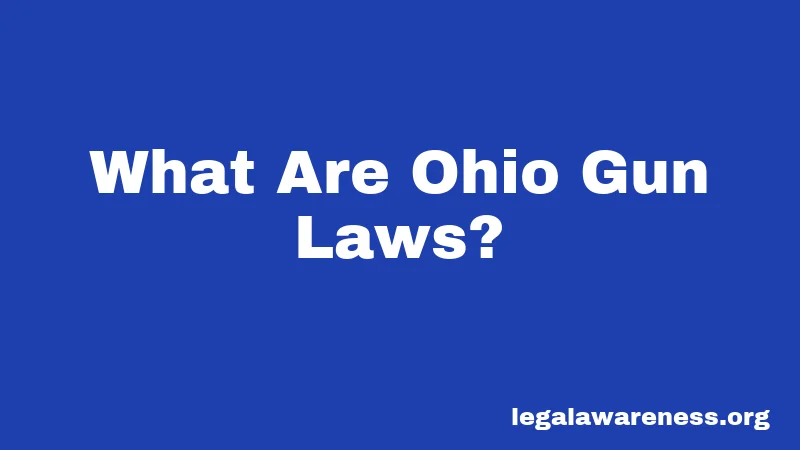Ohio Gun Laws in 2026: The Complete Guide You Need
Most people have no idea how much Ohio gun laws changed recently. Seriously. In January 2025, Governor DeWine signed two major bills that expanded gun rights. But here’s the thing—just because you can do something doesn’t mean you should without knowing all the rules first.
Let’s break down exactly what you need to know about owning, carrying, and using guns in Ohio right now. Stay with me here.
What Are Ohio Gun Laws?

Think of gun laws like the rules of the road for firearms. They tell you who can own guns, how you can carry them, where you can use them, and what happens if you break the rules.
Ohio has been moving toward fewer restrictions over the past few years. The state allows people to own and carry guns pretty freely compared to other states. But—and this is important—there are still limits. You can’t just do whatever you want with a gun in Ohio.
Can You Carry a Gun in Ohio?
Okay, here’s the simple answer: Yes. Pretty much. This one shocked a lot of people.
As of June 2022, Ohio became what’s called a “constitutional carry” state. That means you don’t need a permit to carry a handgun if you’re 21 or older. You also don’t need a permit for open carry (carrying a gun where people can see it). You can just… carry it.
But wait—there’s more to know about this.
You can still get a permit if you want one. Some people like having a permit because it makes traveling across state lines easier. Other states might recognize your Ohio permit when they wouldn’t recognize permitless carry.
The Age Question
Here’s where age gets tricky. Wondering if age limits apply to you? Let me break it down.
For handguns, you need to be 21 or older. For rifles and shotguns, you can be 18 or older. This comes from federal law, which applies everywhere in the country. The difference matters because it changes what you’re legally allowed to carry and own.
Where You CAN’T Carry Guns
Okay, pause. Read this carefully. Just because you can carry doesn’t mean you can carry everywhere.
In Ohio, you cannot carry a gun in certain places, even with a permit. These include federal buildings, courthouses, and some government properties. Private businesses can also ban guns on their property. If they have a “no guns allowed” sign, follow it.
Who Cannot Own or Carry Guns in Ohio?

This part’s serious. Honestly, this is probably the most important rule.
If you fall into any of these categories, you legally cannot own, possess, or carry a firearm in Ohio:
You have a felony conviction. Federal law says anyone convicted of a felony cannot have a gun. This is for life in most cases. It doesn’t matter if the crime was violent or not under federal law. Even if it happened decades ago, the ban typically stays.
You were convicted of domestic violence. Even if it was just a misdemeanor, not a felony, federal law bans you from owning guns. This is true whether you’re male or female. This applies as long as the protective order is in effect.
You are under indictment for a felony. You can own a gun, but you can’t buy or receive a new one while your case is pending.
You have certain mental health orders against you. If a court has found you mentally incompetent or dangerous, you’re prohibited from gun possession.
You are a chronic alcoholic or drug-dependent person. Courts can determine if this applies to you.
You are subject to a protection order. A restraining order for domestic violence, stalking, or harassment makes gun possession illegal.
You have active warrants. If you’re a fugitive from justice, you cannot legally own guns.
You lost your rights and never had them restored. This one matters. If you lost gun rights through conviction, you can apply for restoration in Ohio courts. But restoration isn’t automatic. You’d have to convince a judge.
What Happens If You Violate These Rules?
Breaking this law isn’t a slap on the wrist. Possessing a firearm while you’re prohibited from doing so is a felony in the third degree in Ohio. That means up to three years in prison. Plus fines. Plus a permanent criminal record.
Not good.
Recent Changes: What Happened in January 2025?
Two major bills changed Ohio gun laws at the start of 2025. Both went into effect about 90 days after Governor DeWine signed them on January 8, 2025. These aren’t small tweaks. They matter.
House Bill 452: Self-Defense Expansion
HB 452 expanded Ohio’s “stand your ground” law. You probably already knew you could protect yourself without having to run away first. But this bill added something new.
Now, you can be immune from criminal prosecution and civil lawsuits when you use force to protect people at nonprofits. This includes churches and other religious organizations. You can also protect their guests and members.
This is big because before, you could only use this defense for yourself or your own home. Now it extends to nonprofit properties where you have the right to be.
Senate Bill 58: Two Important Protections
Senate Bill 58 made two key changes that Ohio gun owners care about.
First, it banned the state from requiring gun owners to pay fees or carry liability insurance just for owning a gun. Some other states do this. Ohio said no. You won’t be financially penalized in Ohio simply for choosing to own firearms.
Second, and this is really important, it banned the creation of a state firearm registry. Ohio will not keep a central database of who owns what guns. Your personal gun ownership information stays private. Sales records, transfers, and ownership details won’t be stored in one place.
This matters to a lot of people who worry about government tracking.
How to Carry a Gun Safely in a Vehicle

Sound complicated? It’s actually not too bad once you understand it.
If you have a concealed carry license, you can legally carry a loaded gun in your car. The gun must be on you or accessible in your immediate control.
If you don’t have a license, it gets trickier. You can transport guns in your vehicle, but they need to be unloaded. The ammunition has to be separate from the gun. Think of it like this: the gun in the front, the bullets in the back, with the gun secure.
Some people mess this up and get charged with a felony. Don’t be that person. If you transport firearms, double-check the rules.
Transporting to the Range or Hunting
You’re gonna love this one. You can legally transport firearms to the gun range or hunting grounds. Just follow the rules about having them unloaded and ammunition separate if you don’t have a permit.
Self-Defense Laws in Ohio
You’re not alone—this confuses a lot of people. Let me explain how self-defense actually works.
Ohio law says you can use force, even deadly force, to protect yourself or others. You have no duty to retreat. If you’re somewhere you have the legal right to be, you can defend yourself. The law actually assumes you acted in self-defense if you were lawfully present.
But here’s the important part: you can only use deadly force if you reasonably believe you’re in immediate danger of death or serious harm. You can’t shoot someone for stealing your car. You can shoot someone if they’re attacking you inside the car.
You also can’t use deadly force to protect property. Your stuff isn’t worth a life in the eyes of the law.
What About Rifles and Shotguns?
Most adults in Ohio can own rifles and shotguns without much hassle. You need to be 18 or older for long guns.
You can legally own and possess them. But there are some restrictions on how you transport them. If you carry them improperly, you could face felony charges. This surprised a lot of people and sparked a new bill in 2025.
The “Freedom to Carry Act,” introduced in October 2025, would make it easier to transport long guns. Right now, if ammunition placement doesn’t meet specific requirements, you could get arrested. That bill would change that. But as of now, it’s still pending.
What Guns Are Banned?
Basically not much. Ohio doesn’t ban most rifles or shotguns that you see in stores. But it does ban “dangerous ordinances.” These include:
Machine guns and automatic weapons. Full-auto guns are heavily restricted federally and by Ohio law.
Sawed-off shotguns and rifles. If the barrel is too short, it’s illegal.
Improvised weapons. Guns you make yourself without serial numbers are increasingly restricted.
Short-barreled rifles and shotguns (with limited exceptions through federal licensing).
The state does prohibit devices that turn semi-automatic guns into fully automatic guns. You can’t legally modify a regular gun to fire continuously.
Penalties and Consequences
Let’s get real about what happens when you break Ohio gun laws.
Possessing a firearm while prohibited is a felony in the third degree. That’s up to 36 months in prison. You’ll also likely face fines.
Transporting a gun improperly can be a felony too. Up to 18 months in prison depending on the violation.
Using a gun during a crime adds extra charges. Brandishing a gun during a robbery? That’s a serious felony with additional penalties.
Recklessly handling a firearm? You could face both criminal charges and civil lawsuits. Accidentally discharge a gun? Your neighbor could sue you and win.
Who Gets to Own Guns in Ohio?
If you don’t fall into the prohibited categories, you can own a gun in Ohio. That’s pretty much it.
You don’t need a permit for purchase. You don’t need to register your guns with the state. Private sales don’t require background checks. This is one of the most permissive gun ownership systems in the country.
But—and this is important—there are still limits. Dealers have to conduct background checks. Private sellers don’t legally have to, but it’s smart.
If you’re buying from a licensed dealer, they’ll run a National Instant Criminal Background Check System (NICS) check. This takes a few minutes usually. The system looks for felony convictions, domestic violence records, and other disqualifying factors.
Ohio’s Stand Your Ground and Castle Doctrine
Okay… this one’s important. These laws protect you in ways many people don’t realize.
Castle Doctrine means your home is your castle. You have the right to defend yourself in your own house without a duty to retreat. If someone breaks in and you reasonably believe they’ll hurt you, you can use force.
Stand Your Ground means this extends beyond your home. You don’t have to run away from danger anywhere you have the legal right to be. You can stay and defend yourself.
The burden shifts after House Bill 452. Now, the prosecution has to prove you didn’t act in self-defense. The law assumes you did, if you were lawfully present.
This is huge because it flips the normal burden of proof.
What About Gun Training and Permits?
You don’t need training to own a gun in Ohio anymore. Legally, you don’t.
But should you get training anyway? Honestly, that’s smart. Even though it’s not required, knowing how to safely use your firearm prevents accidents. It also means you’ll be better prepared if you ever have to use it for self-defense.
If you want a concealed carry license, you can get one. You’d need to complete eight hours of firearms training. Military members can get a license without the fee. Active duty military can skip the class entirely if their military training meets the requirements.
You can still get a non-resident concealed carry license if you work in Ohio but live in another state.
Private Sales and Background Checks
Here’s where it gets interesting. Private gun sales in Ohio don’t require background checks. That means if your neighbor wants to sell you a gun privately, the state doesn’t require either of you to do anything special.
But dealers are different. Licensed firearms dealers must run background checks through NICS. They have to keep records. They have to follow federal law.
This creates a gap. You could technically buy a gun privately from someone without any paperwork. But buying from a dealer requires the full process.
Wondering if this applies to you? If you’re buying from a licensed dealer, a background check happens. If you’re buying privately, it doesn’t—but you should ask yourself if you know what you’re doing.
How to Report Illegal Gun Possession
If you know someone who shouldn’t have a gun but does, what do you do?
You can call local law enforcement. Tell them what you know. They can investigate. If someone’s prohibited from gun possession and you know they have one, that’s a serious crime.
You can also contact the Bureau of Alcohol, Tobacco and Firearms (ATF) if you have information about federal gun crimes.
Keep in mind that your information might start a serious investigation. Criminal charges could follow. Make sure you’re reporting something real, not just a suspicion.
Hunting and Firearms
Ohio has specific hunting seasons for different weapons. Firearms hunting season typically runs in December. You’ll need a hunting license, separate from any gun permit.
Hunting regulations control when you can hunt, what you can hunt, and what weapons you can use. These change year to year. Always check the Ohio Division of Wildlife website before heading out.
The good news? You can transport your hunting rifle or shotgun to hunting grounds legally, following the transportation rules we discussed earlier.
Frequently Asked Questions
Can I carry a gun in Ohio without a permit?
Yes, if you’re 21 or older and not prohibited from gun ownership. You don’t need a permit to open or conceal carry a handgun. Rifles and shotguns don’t require permits either.
What happens if a felon is caught with a gun?
It’s a felony in the third degree, punishable by up to three years in prison and fines. It’s a serious crime with lasting consequences.
Are there any fees for gun ownership in Ohio?
No. Senate Bill 58 made sure the state can’t charge you fees or require liability insurance just for owning guns. You only pay if you choose to get a concealed carry license.
Can I carry a gun in my car?
Yes, but it depends on whether you have a license. With a license, you can carry loaded and readily accessible. Without one, your gun must be unloaded with ammunition separate.
What’s the difference between a felony and misdemeanor for gun rights?
Federal law bans gun ownership for felony convictions. Most misdemeanors don’t, except domestic violence misdemeanors, which are also federally banned.
Can I restore my gun rights if I lost them?
Maybe. If you lost rights due to a violent felony conviction in Ohio, you can petition a court to restore them. But there’s no automatic restoration, and federal law might still apply.
What about open carry?
It’s legal in Ohio. You can carry a gun openly. Private businesses can still ban it on their property, but public spaces are fair game.
Do I need to register my gun?
No. Ohio bans state firearm registries. Your gun ownership isn’t tracked in any central database.
Final Thoughts
Now you know the basics of Ohio gun laws. The state has become much more permissive about gun ownership and carry. Senate Bill 58 and House Bill 452 made recent changes that gun owners like.
But remember—just because you can do something doesn’t mean you should without understanding the full picture. These laws are complex. Federal law adds another layer. When in doubt, look it up or ask a lawyer.
If you’re thinking about carrying a gun, get trained. If you’re buying from someone, run a background check anyway. If you know someone breaking these laws, consider reporting it.
Stay informed, stay safe, and respect the responsibility that comes with gun ownership.
References
Ohio Revised Code – Chapter 2923 (Weapons Control)
Bureau of Alcohol, Tobacco, Firearms and Explosives – Federal Gun Laws
National Instant Criminal Background Check System (NICS)
Ohio Attorney General – Gun Laws Information
Ohio Department of Natural Resources – Hunting and Firearms
Ohio Gun Laws January 2025 Updates – WKYC Legal Analysis
